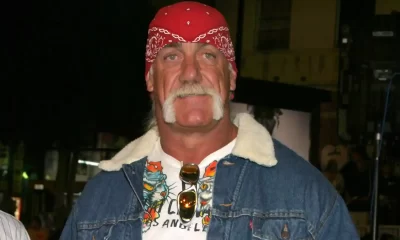Business
Medical Cannabis Donations From Within the Industry Help Reduce Opioid Use

Since 2020, SB-34, also known as the Dennis Peron and Brownie Mary Act, has been giving the cannabis industry an opportunity to give back to those in need.
The recent California state law provides a legal pathway for licensed cannabis operators to donate excess and expiring products at no cost to eligible patients.
From the onset of this new legislation, one of the longest-standing chapters of the National Organization for the Reform of Marijuana Laws (NORML), Los Angeles NORML, a 501(c)(3) non-profit organization, began working alongside the Veterans Cannabis Coalition to affect change through SB-34. Los Angeles NORML Executive Director, Ian Rassman, and Veterans Cannabis Coalition CEO and Founder, Eric Goepel, made it their organization’s mission to focus on developing programs surrounding this unique legislation.
Their program is based on a model developed by Goepel and Shelly McKay, the Co-Founder of Kannabis Works where the program was pioneered. She launched the first day the new SB-34 legislation came into effect on March 1st, 2020. Kannabis Works has maintained a consistent monthly donation since that time. They have become the longest-running donation site under this legislation and serve as the precedent on which other programs have been built.
Rather than creating a standalone nonprofit or a “social justice” lifestyle brand, Los Angeles NORML and the Veterans Cannabis Coalition have been focusing on revitalizing and leveraging existing nonprofit entities. They strive to build cannabis donation programs that simultaneously benefit communities, patients, and the industry as a whole.
While SB-34 does not create any tax incentives, it does reduce the cost by excusing certain state taxes (cultivation, use, and excise) depending on the license type. When properly coordinated across the supply chain, SB-34 donations are able to be delivered to patients with a relatively low shared labor and material cost.

Licensed California cannabis companies are in a unique position to legally give away life-sustaining medicine to people, many of whom suffer greatly from lack of access and/or the means to afford legal cannabis. Every corner of the industry is able to participate. This includes cultivators and manufacturers, retailers (storefront & delivery), distributors, testing labs, brands, and ancillary businesses (legal, tech, admin, etc).
“We have worked with many brands and retailers to locally implement corporate social responsibility programs that truly benefit medical patients in their communities. We are helping these communities by providing safe access to lab-tested products at no cost. Furthermore, we are empowering local retailers and brands to continue compassionate work even past our events. This program is a big part of changing the stigma, and that’s a huge reason I continue to be a proponent of its expansion,” said Ian Rassman. “It has been sending a signal to the community at large that cannabis is medicine.”
Los Angeles NORML and the Veterans Cannabis Coalition are focused on helping veterans, the terminally ill, elderly people, and those suffering from mental health issues. At present, they have over 100+ active participating brands, 600+ unique patients served, 10+ active retail & non-profit partners, and 12 donation sites that have resulted in over $4 Million of retail medical cannabis donated back into the community over the last 2 years.

“It is a very emotionally moving experience to attend one of these donation events,” said Ian Rassman of Los Angeles NORML. “Every single time I hear moving stories of individuals that have been able to reduce or eliminate opioids from their daily medications by substituting cannabis. Overwhelmingly, these patients tell how they used to sit on the couch watching their life pass before them, and now feel that they have returned to life and re-engaged with their family and friends. Those are powerful statements that will really pull at your heartstrings.”
Ian went on to highlight how oftentimes these people are in tears as they tell him stories of how they have rediscovered their best life with the assistance of medical cannabis.

Veterans Cannabis Coalition CEO and Founder, Eric Goepel, said that “we have played a largely behind-the-scenes role in socializing the concept of compassionate donations to the California cannabis industry while providing the connective tissue to sustain it. This includes administrative and technical support, donation procurement, connection to patients and consumers, and education.”
Goepel elaborated, saying, “to that end, I’ve been developing donation and education programs with chapters of the three largest national veteran service organizations: the American Legion, VFW, and Disabled American Veterans. I am also developing a donation pipeline to a frontline harm reduction nonprofit. This group was working with the unhoused on Skid Row and had lowkey been gifting cannabis for years. They’ve seen firsthand the vastly reduced risk and potential benefits.”
“Rather than trying to duplicate what already exists and further fragment support and attention, we bring donations and education as a valuable service to the cannabis-friendly organizations out there,” Eric said.
Goepel made it clear that SB-34 is a means to an end. It’s meant to show how cannabis can improve both one’s individual quality of life, as well as overall public health (by promoting substitution and sparing effects). Los Angeles NORML and the Veterans Cannabis Coalition believe that working with an expanding network of nonprofit partners and funneling viable products that would’ve otherwise wound up discarded to patients is the first step.
The next vital step is securing governmental support. This can come at the city/county or state level to establish a pilot program that would both donate and reimburse patients for medical cannabis purchases and track their health metrics for a year.

Goepel emphasized that “we’re at the stage of normalization and legalization where we theoretically demonstrate the power of cannabis in a way that will leave politicians little room to hedge or dodge.” He went on to say that “the skyrocketing suicide and overdose rate plus a new #3 cause of death (COVID) that is disabling millions of Americans reflects severe, structural failures in many of our institutions.”
Goepel hit the nail on the head when he voiced that “cannabis isn’t the cure-all. But, it is the most promising single tool we have to develop more effective and less harmful medicines at a time when they are desperately needed.”
Active SB-34 donation partners for Los Angeles NORML include the Veterans Cannabis Coalition, Kannabis Works, HERBL, Nabis, Pineapple Express, Amuse, Rove, Pacific Stone, Claybourne, Papa & Barkley, Raw Garden, CRU, CanEx, Coastal Sun, Bird Valley Organics, Emerald Bay Extracts, and more.
Brands that are interested in getting involved should know that only legal operators can provide SB-34 donations. Los Angeles NORML is able to help utilize the program to provide a legal pathway to donate products and establish regular community outreach events. All license types can tag donated products at “SB34” in METRC. Eliminate remediation or retesting costs by taking products with a short shelf life and donating them!

For retailers, you’re able to combine forces with Los Angeles NORML to engage your supply chain partners on a mission of compassion and create content for promotional purposes. You can then educate new market segments to generate product awareness for brands targeting those new markets.
“California is unique in the world in that it is the only state or country with legislation passed allowing for compassionate donations. The success of this legislation in California, in many ways, can serve as a proof of concept for other states and nations to follow,” Ian said. “As this program expands, it continues to act as glaring evidence that cannabis has the potential to heal. We have purposely built this program to be replicated in other markets.”
There are an unlimited number of patients who need help accessing medical cannabis. It’s important to empower individual retailers and brands to develop their own unique programs to further the compassionate donations that SB-34 allows. Los Angeles NORML and the Veterans Cannabis Coalition are putting all of their energy into jumpstarting awareness about this program because it affects real change.
There are other thriving organizations within California that have also created compassion programs that are supplying medicine to those in need. A few of these include Sean Kiernan at the Weed For Warriors Project, Melissa Burgstahler and Kellie Carlton at Dear Cannabis, and of course, Sweetleaf Joe Airone from the Sweetleaf Collective in San Francisco where compassion has been the mantra since 1996.
Ian concluded, saying, “we essentially want the whole world to follow these examples, use the resources already developed, run with it, grow it, and put more medicine into the hands of the people that need it. It is our goal to further expand this program across the US and the wider world as a destigmatizing example for emerging cannabis markets to follow.”

Business
New Mexico cannabis operator fined, loses license for alleged BioTrack fraud

New Mexico regulators fined a cannabis operator nearly $300,000 and revoked its license after the company allegedly created fake reports in the state’s traceability software.
The New Mexico Cannabis Control Division (CCD) accused marijuana manufacturer and retailer Golden Roots of 11 violations, according to Albuquerque Business First.
Golden Roots operates the The Cannabis Revolution Dispensary.
The majority of the violations are related to the Albuquerque company’s improper use of BioTrack, which has been New Mexico’s track-and-trace vendor since 2015.
The CCD alleges Golden Roots reported marijuana production only two months after it had received its vertically integrated license, according to Albuquerque Business First.
Because cannabis takes longer than two months to be cultivated, the CCD was suspicious of the report.
After inspecting the company’s premises, the CCD alleged Golden Roots reported cultivation, transportation and sales in BioTrack but wasn’t able to provide officers who inspected the site evidence that the operator was cultivating cannabis.
In April, the CCD revoked Golden Roots’ license and issued a $10,000 fine, according to the news outlet.
The company requested a hearing, which the regulator scheduled for Sept. 1.
At the hearing, the CCD testified that the company’s dried-cannabis weights in BioTrack were suspicious because they didn’t seem to accurately reflect how much weight marijuana loses as it dries.
Company employees also poorly accounted for why they were making adjustments in the system of up to 24 pounds of cannabis, making comments such as “bad” or “mistake” in the software, Albuquerque Business First reported.
Golden Roots was fined $298,972.05 – the amount regulators allege the company made selling products that weren’t properly accounted for in BioTrack.
The CCD has been cracking down on cannabis operators accused of selling products procured from out-of-state or not grown legally:
- Regulators alleged in August that Albuquerque dispensary Sawmill Sweet Leaf sold out-of-state products and didn’t have a license for extraction.
- Paradise Exotics Distro lost its license in July after regulators alleged the company sold products made in California.
Golden Roots was the first alleged rulebreaker in New Mexico to be asked to pay a large fine.
Source: https://mjbizdaily.com/new-mexico-cannabis-operator-fined-loses-license-for-alleged-biotrack-fraud/
Business
Marijuana companies suing US attorney general in federal prohibition challenge

Four marijuana companies, including a multistate operator, have filed a lawsuit against U.S. Attorney General Merrick Garland in which they allege the federal MJ prohibition under the Controlled Substances Act is no longer constitutional.
According to the complaint, filed Thursday in U.S. District Court in Massachusetts, retailer Canna Provisions, Treevit delivery service CEO Gyasi Sellers, cultivator Wiseacre Farm and MSO Verano Holdings Corp. are all harmed by “the federal government’s unconstitutional ban on cultivating, manufacturing, distributing, or possessing intrastate marijuana.”
Verano is headquartered in Chicago but has operations in Massachusetts; the other three operators are based in Massachusetts.
The lawsuit seeks a ruling that the “Controlled Substances Act is unconstitutional as applied to the intrastate cultivation, manufacture, possession, and distribution of marijuana pursuant to state law.”
The companies want the case to go before the U.S. Supreme Court.
They hired prominent law firm Boies Schiller Flexner to represent them.
The New York-based firm’s principal is David Boies, whose former clients include Microsoft, former presidential candidate Al Gore and Elizabeth Holmes’ disgraced startup Theranos.
Similar challenges to the federal Controlled Substances Act (CSA) have failed.
One such challenge led to a landmark Supreme Court decision in 2005.
In Gonzalez vs. Raich, the highest court in the United States ruled in a 6-3 decision that the commerce clause of the U.S. Constitution gave Congress the power to outlaw marijuana federally, even though state laws allow the cultivation and sale of cannabis.
In the 18 years since that ruling, 23 states and the District of Columbia have legalized adult-use marijuana and the federal government has allowed a multibillion-dollar cannabis industry to thrive.
Since both Congress and the U.S. Department of Justice, currently headed by Garland, have declined to intervene in state-licensed marijuana markets, the key facts that led to the Supreme Court’s 2005 ruling “no longer apply,” Boies said in a statement Thursday.
“The Supreme Court has since made clear that the federal government lacks the authority to regulate purely intrastate commerce,” Boies said.
“Moreover, the facts on which those precedents are based are no longer true.”
Verano President Darren Weiss said in a statement the company is “prepared to bring this case all the way to the Supreme Court in order to align federal law with how Congress has acted for years.”
While the Biden administration’s push to reschedule marijuana would help solve marijuana operators’ federal tax woes, neither rescheduling nor modest Congressional reforms such as the SAFER Banking Act “solve the fundamental issue,” Weiss added.
“The application of the CSA to lawful state-run cannabis business is an unconstitutional overreach on state sovereignty that has led to decades of harm, failed businesses, lost jobs, and unsafe working conditions.”
Business
Alabama to make another attempt Dec. 1 to award medical cannabis licenses

Alabama regulators are targeting Dec. 1 to award the first batch of medical cannabis business licenses after the agency’s first two attempts were scrapped because of scoring errors and litigation.
The first licenses will be awarded to individual cultivators, delivery providers, processors, dispensaries and state testing labs, according to the Alabama Medical Cannabis Commission (AMCC).
Then, on Dec. 12, the AMCC will award licenses for vertically integrated operations, a designation set primarily for multistate operators.
Licenses are expected to be handed out 28 days after they have been awarded, so MMJ production could begin in early January, according to the Alabama Daily News.
That means MMJ products could be available for patients around early March, an AMCC spokesperson told the media outlet.
Regulators initially awarded 21 business licenses in June, only to void them after applicants alleged inconsistencies with how the applications were scored.
Then, in August, the state awarded 24 different licenses – 19 went to June recipients – only to reverse themselves again and scratch those licenses after spurned applicants filed lawsuits.
A state judge dismissed a lawsuit filed by Chicago-based MSO Verano Holdings Corp., but another lawsuit is pending.
Source: https://mjbizdaily.com/alabama-plans-to-award-medical-cannabis-licenses-dec-1/
-

 Business2 years ago
Business2 years agoPot Odor Does Not Justify Probable Cause for Vehicle Searches, Minnesota Court Affirms
-

 Business2 years ago
Business2 years agoNew Mexico cannabis operator fined, loses license for alleged BioTrack fraud
-

 Business2 years ago
Business2 years agoAlabama to make another attempt Dec. 1 to award medical cannabis licenses
-

 Business2 years ago
Business2 years agoWashington State Pays Out $9.4 Million in Refunds Relating to Drug Convictions
-

 Business2 years ago
Business2 years agoMarijuana companies suing US attorney general in federal prohibition challenge
-

 Business2 years ago
Business2 years agoLegal Marijuana Handed A Nothing Burger From NY State
-

 Business2 years ago
Business2 years agoCan Cannabis Help Seasonal Depression
-

 Blogs2 years ago
Blogs2 years agoCannabis Art Is Flourishing On Etsy













